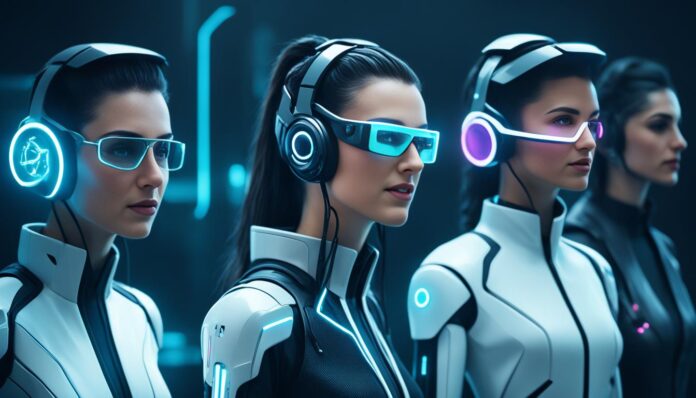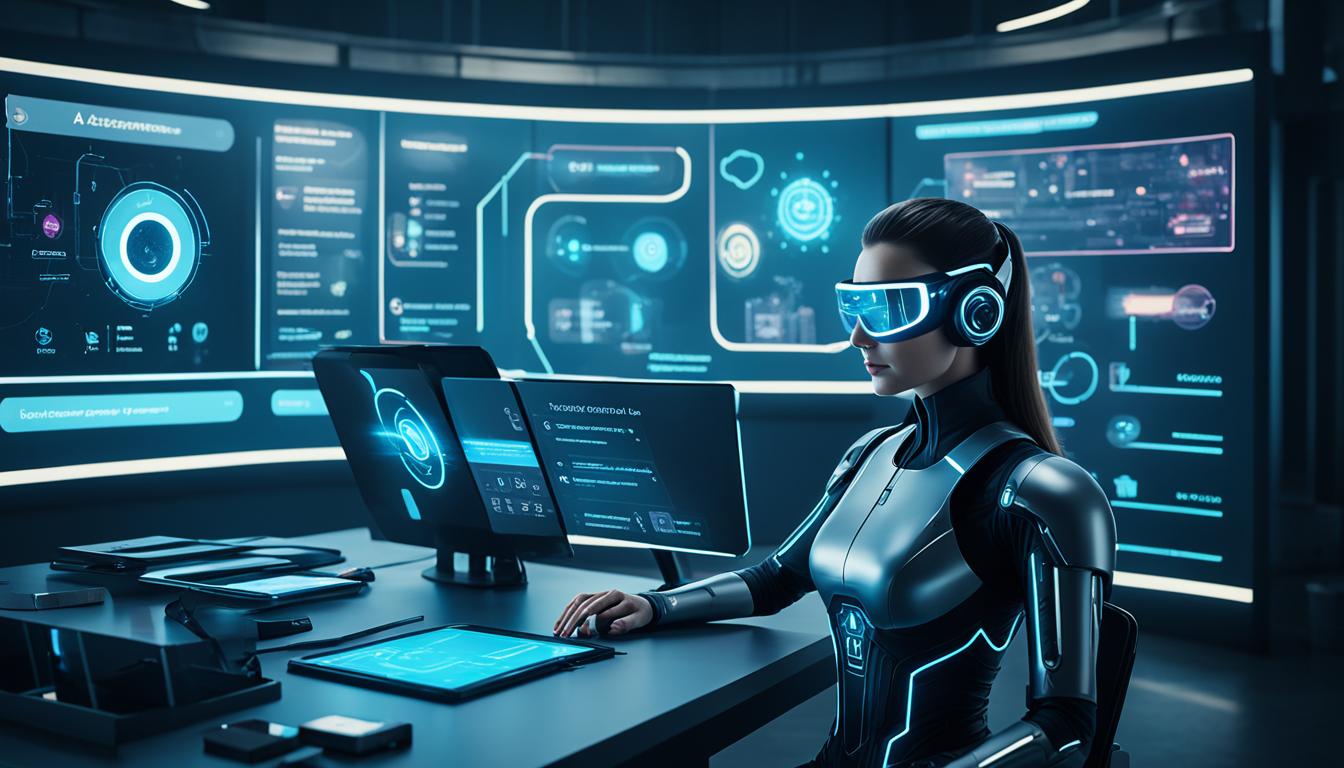
AI-powered virtual assistants are dramatically changing the way businesses interact with customers. By 2025, AI is projected to power a staggering 95% of customer interactions. This doesn’t just mean replacing human operators with chatbots, but creating intelligent systems that learn from each interaction to get better over time. Customers increasingly prefer to find answers themselves rather than waiting on hold for help, and AI-powered solutions provide the immediacy and convenience they demand.
AI-powered chatbots are also revolutionizing the business world by improving efficiency and reducing costs, with projected annual savings of $8 billion by 2023. Customers are becoming more comfortable making purchases directly from chatbots, with surveys suggesting that 67% would be content to use an automated chatbot for their shopping needs.
Key Takeaways
- By 2025, AI is expected to power 95% of customer interactions.
- Customers prefer self-service and instant access to information, which AI-powered solutions provide.
- AI-powered chatbots are improving business efficiency and reducing costs, with projected annual savings of $8 billion by 2023.
- Customers are increasingly comfortable making purchases directly through chatbots, with 67% willing to use an automated chatbot for their shopping needs.
- AI-powered virtual assistants are transforming the customer service landscape, offering personalized, efficient, and immediate support.
The Rise of AI-Powered Virtual Assistants
AI technologies have revolutionized the way businesses connect with customers, delivering personalized experiences that were once a luxury but are now an expectation. At the heart of this evolution is the AI-powered recommendation engine, which leverages customer data to suggest products or services that align with individual preferences and behavior patterns, resulting in a significant boost in conversion rates, by up to 30%.
AI-powered virtual assistants offer round-the-clock customer service and promise significant economic benefits, with IBM reporting that implementation of chatbot technology can cut operational costs by up to 30%. Businesses are already embracing AI to enhance customer experiences, with 56% of businesses having already adopted AI, and projections showing virtual assistants handling an astounding 85% of all customer interactions by 2023.
Advancements in Natural Language Processing
The rapid progress in natural language processing (NLP) has been a game-changer, enabling AI-powered virtual assistants to engage in more natural, conversational interactions with users. These advancements in NLP allow virtual assistants to better understand user intent, respond with more contextually relevant information, and even handle more complex queries and requests.
Multimodal Interaction and Voice Recognition
The integration of multimodal interaction and voice recognition capabilities has further enhanced the user experience with AI-powered virtual assistants. Customers can now interact with these assistants through a combination of voice, text, and even visual cues, creating a more intuitive and seamless user experience. This allows for hands-free, natural language-based interactions, which are particularly valuable in certain scenarios, such as when a user’s hands are occupied or when they need to access information quickly.
Personalized and Context-Aware Assistants
The next evolution of AI-powered virtual assistants involves the development of personalized and context-aware solutions. By leveraging advanced predictive analytics and machine learning algorithms, these assistants can learn from each user interaction, building a deep understanding of their preferences, behaviors, and the context in which they operate. This enables the virtual assistants to provide highly tailored, proactive, and relevant support, delivering an exceptional customer experience that anticipates and addresses user needs before they are even articulated.
The Impact of AI-Powered Virtual Assistants
The integration of AI-powered virtual assistants into customer service has yielded significant benefits, transforming the landscape of business-customer interactions. These advancements have not only improved the overall customer experience and satisfaction but have also driven substantial cost savings and operational efficiency for organizations.
Improved Customer Experience and Satisfaction
By leveraging the power of conversational AI and natural language processing, businesses can reduce response times by up to 80%, providing customers with instant access to relevant information or guidance through problem-solving steps. This speed not only benefits customers but also helps businesses operate more efficiently, reducing the frustrations associated with waiting on hold or being passed from person to person.
Moreover, the integration of personalized assistants and predictive analytics in customer service aims to enhance the overall customer experience by delivering tailored, timely, and proactive support. Sentiment analysis tools empower businesses to address customer concerns promptly and empathetically, fostering stronger relationships and increasing customer satisfaction levels.
Cost Savings and Operational Efficiency
AI-powered solutions can boost agent productivity by 14% and help them complete their tasks 35% faster, allowing them to provide faster and more quality service, resulting in happier customers. This increased efficiency not only benefits the customer experience but also translates to significant cost savings for businesses, as they can optimize their operations and resources more effectively.
Furthermore, the integration of voice recognition and multimodal interaction technologies in virtual assistants enables seamless and intuitive customer interactions, further streamlining the support process and reducing the need for human intervention, ultimately leading to substantial operational cost reductions.

How will AI-powered virtual assistants evolve to meet user needs by 2025?
Looking ahead, the future of AI in customer service holds exciting prospects and innovations. Advancements in AI, particularly in areas like Deep Learning and Reinforcement Learning, are expected to further enhance the capabilities of chatbots and virtual assistants, making them even more intuitive and adaptable to complex queries. Integration of AI with other emerging technologies such as Augmented Reality (AR) and Virtual Reality (VR) may revolutionize customer support by offering immersive experiences.
Predictive Analytics and Proactive Assistance
Additionally, the concept of hyper-personalization, driven by AI algorithms, will continue to evolve, delivering highly tailored customer experiences based on individual preferences, behaviors, and context. Furthermore, the integration of AI with Internet of Things (IoT) devices will enable virtual assistants to provide more proactive and predictive assistance, anticipating customer needs and offering seamless, context-aware interactions.
Integration with Internet of Things (IoT) Devices
The integration of AI with Internet of Things (IoT) devices will enable virtual assistants to provide more proactive and predictive assistance, anticipating customer needs and offering seamless, context-aware interactions. This integration will allow virtual assistants to leverage data from various connected devices to offer personalized and timely support, enhancing the overall user experience.
Explainable AI and Transparent Decision-Making
Explainable AI and transparent decision-making will also become increasingly important, ensuring that AI-powered virtual assistants can provide clear, understandable, and accountable responses to users. As AI systems become more advanced, it will be crucial to ensure that their decision-making processes are transparent and their actions can be easily explained, fostering trust and confidence among customers.
Conclusion
The evolution of AI-powered virtual assistants has undoubtedly transformed the customer service landscape. Chatbots, intelligent virtual agents, and other AI-driven solutions have become integral in enhancing operational efficiency and delivering personalized experiences for businesses across diverse sectors. As AI technology continues to advance, the integration of these powerful tools with customer service is poised to offer even more sophisticated, intuitive, and seamless interactions, ultimately redefining the relationship between businesses and their customers in the digital age.
Embracing these technological advancements while addressing ethical concerns will be crucial in shaping a future where AI-driven customer service elevates satisfaction, loyalty, and engagement to unprecedented levels. By leveraging the power of predictive analytics, proactive assistance, and transparent decision-making, businesses can create a customer-centric ecosystem that anticipates and responds to individual needs with precision and empathy.
As we move towards 2025 and beyond, the continued innovation and responsible implementation of AI-powered virtual assistants will be a pivotal force in revolutionizing the way businesses connect with their customers, fostering stronger relationships, increasing operational efficiencies, and delivering exceptional experiences that set them apart in a highly competitive landscape.
FAQ
How will AI-powered virtual assistants evolve to meet user needs by 2025?
AI-powered virtual assistants are expected to evolve dramatically by 2025, with advancements in areas like natural language processing, multimodal interaction, personalized assistants, predictive analytics, and explainable AI. These innovations will enable virtual assistants to become more intuitive, adaptable, and effective in meeting the varied needs of users.
What are the key advancements in AI-powered virtual assistants?
The evolution of AI-powered virtual assistants will be driven by advancements in natural language processing, multimodal interaction and voice recognition, as well as the development of personalized and context-aware assistants that can provide more tailored support to users.
How will AI-powered virtual assistants impact customer experience and business operations?
AI-powered virtual assistants are poised to significantly improve customer experience and satisfaction, while also delivering cost savings and operational efficiency for businesses. They can reduce response times, boost agent productivity, and provide personalized, empathetic support to customers.
What future innovations will shape the evolution of AI-powered virtual assistants?
The future of AI-powered virtual assistants will be shaped by advancements in predictive analytics and proactive assistance, integration with Internet of Things (IoT) devices, and the development of explainable AI and transparent decision-making, all of which will enable even more sophisticated and personalized user experiences.
